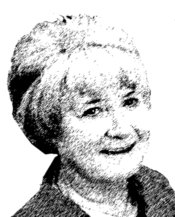Caregivers Deserve Better
By Evelyn Pyburn
As jobs go begging in Montana people are often asking why. Where are the workers?
While it’s true that more workers are working now than ever before in Montana, it’s also true that there are businesses going out of business because they can’t get the workers they need. The Federal Reserve Bank recently asked the question, “Who’s not working?” If one takes measure of the people around them, their answer isn’t so surprising. Fully, 30 percent of working age Americans (25-54) who are not working are not in the formal labor force because they are caregivers. (I very much hesitate to say they are not working because being a caregiver – especially if doing so for both children and aging parents is very hard work indeed.)
For people in this age group, full-time caregiving is more common than not working due to school, poor health, unemployment, or military service.
In the big picture this should be a beautiful thing – to have parents actually raising their children, and families engaged in caring for their elderly or disabled rather than being institutionalized, is one of the greatest strengths our society could have.
About a third of caregivers are focused on children under age 6. The balance are either taking care of elderly relatives and some are caring for both the elderly and children. They are called the “Sandwich Generation” with most in the 40 year- age group and thieir numbers are growing.
The Seniorly Research Center (see front page article in this issue) reports a record 53 million Americans provide an estimated $600 billion annually in unpaid family caregiving. The number is up from 43.5 million in 2015. And, they add, “it is taking an enormous toll on their financial, physical, and mental health,” of the caregivers.
As I think about the people I know and what they are doing, these findings are not surprising and I suspect that is true for most of us. Over the past ten years, or so, I have known lots of people who have dedicated themselves, caring for elderly relatives—and as someone who has also done so in the past, I know it is one of the hardest things anyone can do. Watching friends who continue to do so, I am convinced that as a society we do not give caregivers the respect and gratitude they deserve.
Part of the reason I know they are not given the consideration they should have is because of all the laws and regulations that are thrown in their way to make the jobs of government regulators easy while imposing incredibly ridiculous burdens on caregivers, who they really should be trying to help.
Just one little example: when my mother needed to go into assisted living and I tried to change her address at the post office, I was told I needed to bring my mother to the post office to do so. Taking my mother anywhere at that point in time was a half-day, major undertaking. While there are undoubtedly bad actors who must be guarded against — sorting that out should be the responsibility of people hired to do that. Their course of action should not be to push it onto the shoulders of someone who is already burdened with the phenomenal challenge of caregiving – most often without compensation.
I know one lady who told me her frustrations in trying to help an elderly, close family friend get medical care and assistance through various programs. For months she had had to deal with every kind of roadblock imaginable, usually by well-meaning people, sitting casually at desks, sipping their morning coffee, quoting by rote the rules – rules that imposed more work on everyone, and often creating serious delays. Delays that take a toll on the patient, as well as the caregiver. My friend explained how she eliminated most of her problems. She had a very professional-looking badge made, with her name on it and the title “Caregiver” embossed under it. It worked like magic. So what does that tell you?
Of course many of the most important caregivers in our society are the people who staff the medical facilities and other agencies that serve aging America, and they should be every bit as recognized and appreciated. In fact, quite often it was through them that I resolved problems that their superiors seemed quite indifferent about. Often on the QT, they would whisper what I should do to resolve a problem. Apparently, for the staff to be truly helpful was not allowed.
But the point is, those who think they are doing a good job in regulating this industry, aren’t.
And, unless and until you have been there and done that, most people do not realize the grave disservice, we as a society and community are imposing on people who deserve so much better. If, as these studies indicate, there is going to be more and more people in need of a better system, then let’s make it happen for the benefit of us all.
And by the way – the next time you see a caregiver, give them a hug and say thank you.


0 comments